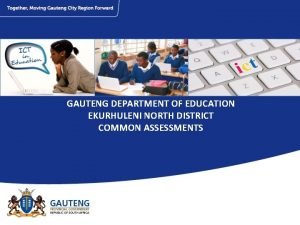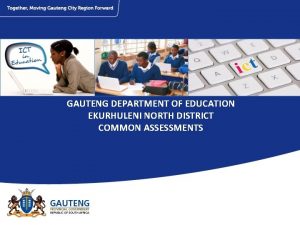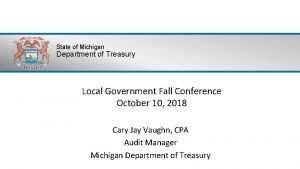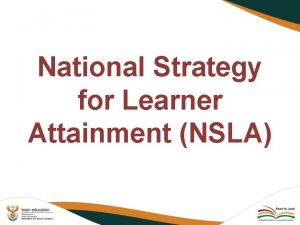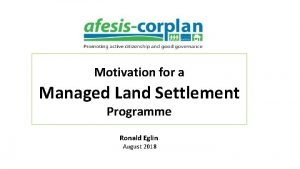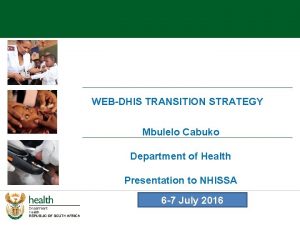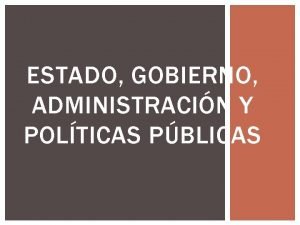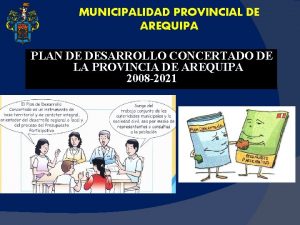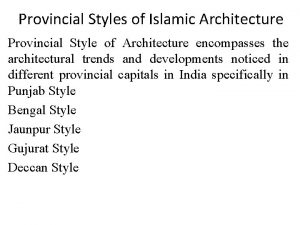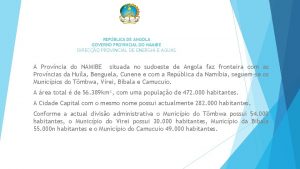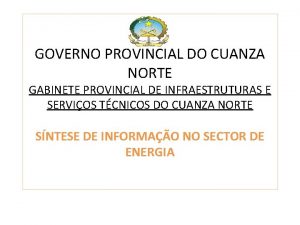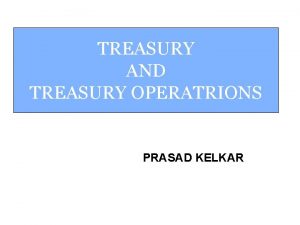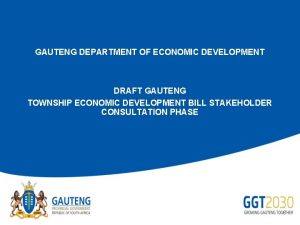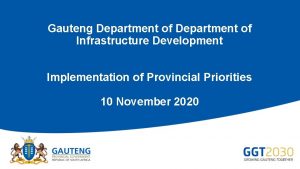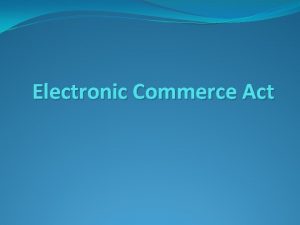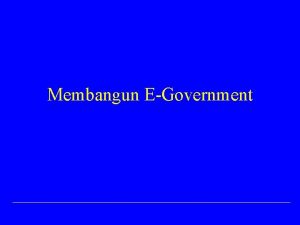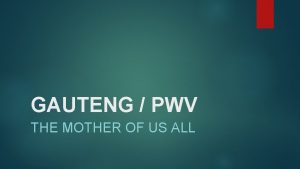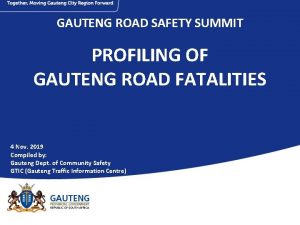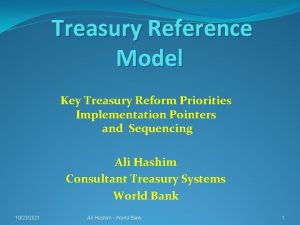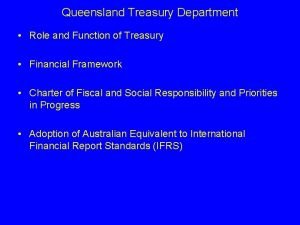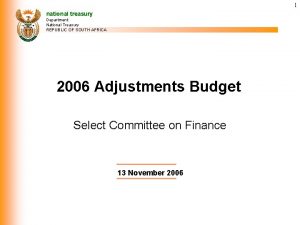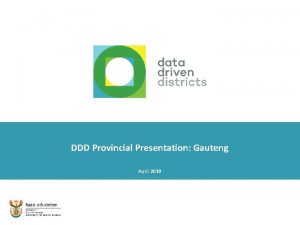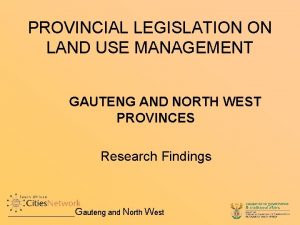Gauteng Provincial Treasury Department of eGovernment Implementation Progress

















- Slides: 17

Gauteng Provincial Treasury & Department of e-Government Implementation Progress on GGT Priorities Post Exco Lekgotla Media Briefing 10 November 2020

Departmental alignment to national and provincial priorities Medium Term Strategic Framework • Priority 1: Economic Transformation and Job Creation • Priority 6: A Capable, Ethical and Developmental State Provincial Priorities – Growing Gauteng Together • Building a capable, ethical and developmental state • Economy, jobs and infrastructure • Education, skills revolution and health • Safety, social cohesion and food security • Integrated human settlements and land release • Sustainable development for future generations • A better Africa and world GPT Priorities • Enhanced sound finances in the province • Increased oversight and compliance with legislated prescripts • Sustainable local government finances • Reduced youth unemployment • Alternative sources of funding 3

4 GGT 2030: Building a Capable, Ethical and Developmental State GGT Priority Action to achieve Improving efficiencies, addressing leakages and ensuring revenue generation GGT Measure of Success Enhanced revenue collection and credible budgets to facilitate service delivery GPT Outcome Output Enhanced Provincial own revenue collection sound finances increase in line with inflation in the province 2020/21 2021/22 2022/23 2023/24 Target/progress as at q 2 Target 5. 3% - annual target applicable in Q 4 6% 6. 5% 2 2 2 60% or less 59% or less Main and adjustment MTEF budgets 3 (1 special adjustment) tabled GPG wage bill contained at not more 60% or less - annual target than 60% of GPG allocated budget applicable in Q 4 • Own revenue collection has been negatively affected by COVID-19. But the situation is improving now that the economy is opened. A revised revenue collection strategy is currently being implemented. • GPG wage bill contained at not more than 60% of GPG allocated budget 4

5 GGT 2030: Building a Capable, Ethical and Developmental State GGT Priority Action to achieve Improving public financial management and audit outcomes GGT Measure of Success Improved audit outcomes for GPG institutions GPT Outcome Output 2020/21 Target/progress as at q 2 100% submission (departments and entities) Increased AFS submitted by all departments oversight and entities compliance with legislated Consolidated Annual Financial 19/20 Consolidated Annual prescripts Statements tabled within Financial Statements tabled prescribed timelines annual target applicable in q 4 (Government Gazette No. 43188) Approved internal audit reports 85% - annual target applicable issued (departments and entities) in Q 4 • • 2022/23 Target 100% 2021/22 Target 100% 20/21 Consolidated Annual Financial Statements tabled 90% 20122 Consolidated 22/23 Annual Financial Consolidated Statements tabled Annual Financial Statements tabled 95% The external audit is still ongoing and the preliminary status is as follows: o Clean audits – 4 departments and 6 entities o Unqualified – 3 departments and 4 entities o Qualified – 1 department o Outstanding – 6 departments and 8 entities Additional internal audits were conducted during the pandemic as requested by the Command Centre 5 2023/24 Target 100%

6 GGT 2030: Building a Capable, Ethical and Developmental State GGT Priority Action to achieve Fighting corruption in the department and across the city-region The introduction of new financial technological systems and efficiencies to GGT Measure of Success improve compliance 2020/21 GPT Outcome Increased oversight and compliance with legislated prescripts Output Reports on the supplier invoices submitted electronically SCM risk compliance assessments Target/progress as at Q 2 70% (79% submission of invoices by supplies) 14 - annual target applicable in q 4 2021/22 2022/23 2023/24 Target 80% 90% 14 14 14 • The utilisation of the e-invoicing system (EIS) saw an increase in the electronic submission of invoices – lockdown forced more suppliers to submit their invoices electronically, etc. • Compliance Risk Register has been completed for 14 departments and during covid-19 lockdown, compliance assessments were conducted on COVID-19 transactions across all departments 6

7 GGT 2030: Building a Capable, Ethical and Developmental State GGT Priority Action to achieve Promoting a responsive, accountable, effective and efficient provincial and local public service GGT Measure of Success Capacity building of municipalities in respect of financial service GPT Outcome Output Sustainable local government finances MFMA compliance assessments Budget assessments 2020/21 Target/progress as at q 2 32 (16) 24 (16 - 8 draft and 8 adopted budget assessments) 2021/22 Target 2022/23 Target 2023/24 Target 32 32 32 24 24 24 Support to municipalities: • MFMA Inductions and Municipal Finance Management Programme Training conducted - m. SCOA, Municipal Budgets & IYMs, GRAP, Asset Management and Revenue Management, Auditing for Internal Auditors in the Public Sector, MPACs oversight role and Investments Management Workshops (during lockdown (L 5 -3) through MS Teams, etc. and currently direct support at municipalities); • Year-end preparations, review accounting policies, high level technical reviews of the AFS and Asset registers before submission to the AG; • Review of Internal Audit Plans, IA & AC Charters and Methodologies; • Support on municipal budget preparation is on 2020/21 Annual budget benchmarking engagement with the Accounting Officer and the CFO to advice on approval of funded budgets. 7 to • Facilitate and host MEC Finance, Mayors to strategise with MEC Finance on financial turnaround strategies from unfunded budgets approval.

8 GGT 2030: Economy, Jobs and Infrastructure GGT Priority Action to achieve GGT Measure of Success GPT Outcome Output Increased 30% spending reports on township oversight and suppliers compliance with Departmental 30 -days payment legislated compliance reports prescripts % of youth in development programmes against the staff establishment • • Tracking township economy spend and empowering those previously excluded from the mainstream of our economy Goods and services procured from township businesses, accounting for 30% of the GPG’s procurement spend and contribution to youth development 2020/21 Target/progress as at q 2 2021/22 Target 2022/23 Target 2023/24 Target 4 (2 reports produced - 11%) 4 (2 Report produced Excl DOH/DID – 94%) 10% (8. 5% - 67 youth) 4 4 4 10% 10% Township spend is sitting at R 692 m, which represents 11. 05% of the total addressable spend. Reasons for not achieving TER Targets, amongst others are: o Bulk procurement during Covid was undertaken by the Department of Health. In as much as the department succeeded in procuring from black companies, it did not impact on township suppliers. Mitigating matters for TER: o PSCM to render continuous supplier development workshops o Development of subcontracting tool to be fastracked to close out leakages o TER will form part of the standing agenda items for the SCM Forum to encourage institutions to develop initiatives that will drive the achievement of the set target o DED Gazetted the Gauteng Township Economic Development to make it easier for SMMEs to access funding and technical (business 8 development) support from government

GGT 2030: Economy, Jobs and Infrastructure • Rooftop Solar PV: obtained support from City Power and City of Tshwane, Mogale City, Merafong LM and Lesedi LM on grid-connectivity. This will lead to obtaining the generation licences from NERSA and concluding financial close of the project by the end of the financial year. • Tshwane Innovation Hub (EB 2 & EB 3): The South African National Space Agency (SANSA) committed to a 10 -year lease agreement as the anchor tenant for Enterprise Building 3. Process is underway to finalise tenancy agreements for available space within EB 2 and EB 3 and this will lead to financial close of the projects by end of the financial year. • Bokamoso Ba Rona Initiative: GIFA is working with Project Manager of Bokamoso to roll out the implementation of Merafong Bio-energy Park and West Rand Agri-park on a 30 -hectare piece of land made available by Sibanye Stillwater. 9

10 Conclusion • Provide oversight and support to departments and municipalities in management of public finances. • The Department will continue with the enhancement of value for money through strengthening institutional capacity and capability through the Infrastructure Development Management System. • Provide support continuous technical advice to municipalities, esp with regards to MFMA compliance monitoring • Given the current economic situation, revenue is expected to decline, as such implementation of the revised revenue strategy should be accelerated 10

Gauteng Department of e-Government

12 Background • The 6 th Administration of the Gauteng Provincial Government has adopted GGT 2030 as a POA to accelerate the delivery of digital government services • The Department contributes to the following GGT 2030 priorities: • Economy, Jobs and Infrastructure • Education, Skills Revolution and Health • A capable, ethical and developmental state • The Department of e-Government has a five-pillar strategy aligned to the TMR, to achieve a digital ecosystem for the GCR. The five pillars are: • • • Pillar 1 – Modernised ICT Infrastructure and Connectivity Pillar 2 – Digital Platform, e-Services and Applications Pillar 3 – Provincial ICT Oversight and Governance Pillar 4 – ICT Solutions Advocacy, Facilitation and Communication Pillar 5 – ICT Industry Stimulation and Skills Development 12

13 Strategies to Build a Digital GCR – e. Gov’s Plans for the Current Term • Pillar 1 – Modernized ICT Infrastructure and Connectivity • Continue to implement strategic partnerships for the rollout of the Wide and Local Area Network (LAN) at all remaining sites in the province. • Continue with the implementation of Voice Over Internet Protocol (Vo. IP) rollout to reduce the cost of telephony. • The aim is to create a unified GCR network where the sharing and reuse of existing broadband connectivity between various entities in the GCR must take place in order to provide wall to wall connectivity coverage to GCR • Pillar 2 – Digital Platform, e-Services and Applications • Facilitate digitizing all identified GPG services. • A single sign-on to all government services. • Pillar 3 – Provincial ICT Oversight and Governance • The Department will reinforce the existing ICT governance mechanisms of the province to include GCR entities and review the role of the CIO Council in ensuring compliance to legislative frameworks. • Establish a framework for the development, approval and testing of applications and e-services, supporting all 5 corridors. • Pillar 4 – ICT Solutions Advocacy, Facilitation and Communication • The ICT Solutions Advocacy, Facilitation and Communication initiatives will enjoy greater prevalence, with a particular focus of ensuring that citizens are made aware of the available e-services. • Employ regular client surveys to ascertain the needs and discomfort of citizens with the existing e-service regime in order to better serve their needs. • Pillar 5 – ICT Industry Stimulation and Skills Development • Implementation of on-line learning initiatives for GPG staff and the citizens. • Prioritize the development of high-level ICT skills in GPG through providing internal ICT bursaries. • Explore ICT skills development initiatives with ICT partners to support the Tshepo 1 Million Programme.

e-Government’s Key Contributions towards GGT 2030 GGT Actions to Achieve GGT Measure of Success Affordable broadband high speed internet connectivity in Gauteng 100% of government services on digital platforms. Digital economy skills and link private sector innovation and skills academies with our public education system. Implement low-cost e-learning training courses • Prioritising last mile connectivity to government institutions • Development, testing and implementation of all identified eservices and related business processes Establish Gauteng as a hub of the 4 IR, centre of digital economy, home of AI, crypto currency and big data through facilitating the work of the Provincial 4 IR Advisory Panel Online learning trainings and digital literacy programmes through partnerships with the private sector, civil society and academia, institutions of learning and research Apprenticeships and vocational training, and, technological knowledge and digital skills for the Fourth Industrial Revolution Smart and efficient digital public services established, supporting improved delivery in areas such as revenue collection, service provider payment, education, health and library services, policing, and infrastructure project monitoring Improved use of smart technology and social media platforms for increased public participation and communication. • • • Building efficient and smart systems, processes • and points of access that provide seamlessly integrated services across the province – with government functioning as “one”. •

15 Progress on the Implementation of the Strategies • The Department has achieved a number of successes in each of the pillars that has laid the foundation for the modernisation agenda of the province. • This has been particularly notable during the COVID-19 pandemic where the Department has come to the fore in providing ICT services to the provincial departments of Education, Social Development, Health and OOP. The Department has exceeded the number of planned e-services for development due to the COVID-19 response. • The Department has facilitated the establishment of the Premier’s 4 IR Advisory Panel • The Department has identified the specific challenges, mitigations and implementation plans, with the required roadmaps, to address the challenges in each of the Pillars of the Strategy. 15

16 Progress on the Implementation of the Strategies Outcome Indicator Connectivity of 3000 Number of LAN sites through the integrated Gauteng Broadband Network (GBN) 2020 Target 2021 Target Progress to Date 90 476 21 30 40 2 8 7 3 6 7 2 80 80 15 Number of sites provided with VOIP 100% of government Number of new eservices on digital Services developed platforms Number of e-Services tested by the DAV Centre Ensure that Number of previously Gauteng is the hub disadvantaged ICT of fourth industrial entrepreneurs revolution skills supported Comments on Progress The target was applicable to Quarters 3 and 4 however progress was made to deliver in Quarter 2. The number of planned e-services delivered responded to the provincial COVID-19 demands A mechanism to ensure the targeted SMMEs are reached, will be implemented.

PROGRESS ON THE 4 IR PANEL Workstream 4 IR Strategy (Growth Strategy) Digital and Infrastructure Technologies Key Outcome Gauteng’s competitive positioning, current and proposed digital future, supported e The first draft of -gov (balance e-gov, business, society). The development of the overarching the 4 IR Strategy strategy is on-going. should be ready mid November Meaningful connectivity that provides inclusive access, support new business, 2020 create new players and markets and drives service delivery. the workstream will be engaging ICASA on all matters connectivity, Infrastructure and technology in the next week. 4 IR RDI 4 IR applications for digital government (service delivery) and a dynamic private sector and social applications (continuous discovery and innovation). The workstream is collaborating extensively with the CSIR and Tshimologong Precinct on areas of innovation ecosystem, e-procurement and open data. 4 IR Skills Development Skills for the future of work, supporting Government service delivery, production service enterprises, and other economic sectors. Skills for the future and digitization have been identified. ICT Governance Skills for the future of work, supporting Government service delivery, production service enterprises, and other economic sectors. ICT Governance will interface with the workstream

18 Thank you
 Sa-sams marksheets 2020
Sa-sams marksheets 2020 Gauteng department of education atp
Gauteng department of education atp 10 pillars of gauteng department of education
10 pillars of gauteng department of education Department of treasury
Department of treasury Physical progress and financial progress
Physical progress and financial progress Gauteng north strategy for learner attainment memo
Gauteng north strategy for learner attainment memo Sapa gauteng
Sapa gauteng Gauteng rapid land release programme
Gauteng rapid land release programme Webdhis kzn
Webdhis kzn Diferencia entre gobierno nacional, provincial y municipal
Diferencia entre gobierno nacional, provincial y municipal Provincial achievement tests
Provincial achievement tests Ontario provincial committee
Ontario provincial committee Municipalidad provincial de arequipa
Municipalidad provincial de arequipa Provincial style of architecture
Provincial style of architecture Governo provincial do namibe
Governo provincial do namibe Society and culture in provincial america
Society and culture in provincial america Localización
Localización Governo provincial do cuanza norte
Governo provincial do cuanza norte

